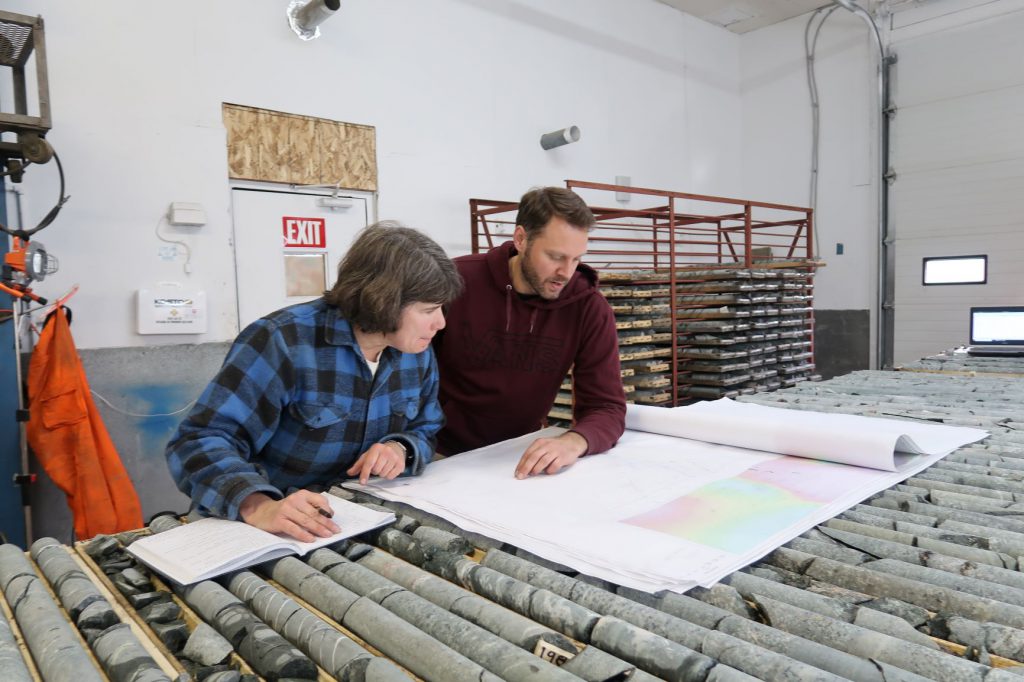GFG up 100% on Timmins gold drilling news

GFG Resources Inc. [GFG-TSXV; GFGSF-OTCQB] shares rallied sharply Monday April 6 after the company said it has intersected a significant high-grade gold system at the Nib Prospect at its 100%-owned Pen Gold Project located 40 km west of Timmins, northeast Ontario.
The company said one hole (PEN-20-47) intersected 71.27 g/t gold over 8.5 metres, including 511.0 g/t gold over 1.15 metres at a vertical depth of approximately 50 metres below surface.
GFF Resources shares jumped on the news, rising 100% or $0.09 to 18 cents on volume of 1.74 million. The shares are currently trading in a 52-week range of $0.07 and 44 cents.
GFG Resources is a Saskatoon, Saskatchewan-based precious metals exploration company. The company owns 100% of the Pen and Dore gold projects, which are both located west of the Timmins mining district, a region which has produced over 70 million ounces of gold. GFG said Pen and Dore have the same geological setting that has produced most of the gold in the Timmins camp.
GFG is also actively exploring the Rattlesnake Gold Project, southwest of Casper, Wyoming, via an earn-in agreement with Newcrest Mining Ltd. [NCM-ASX].
In December 2017, GFG consolidated a large land package covering 680 km2 in the Timmins area, where previous exploration work and drilling identified several distinctive and prospective zones of gold mineralization as well as targets that were expected to be the focus of upcoming exploration programs.
The Pen Gold Project covers 445 km2 and is situated between Newmont Goldcorp Corp.‘s [NGT-TSX, NEM-NYSE] Borden gold project and the West Timmins Mine.
The property consists of 162 claims and covers a 40-kilometre-long section of Archean greenstone that contains the interpreted western extension of the Porcupine-Destor Fault zone that hosts most of the gold deposits found in the Timmins Gold Camp.
The Nib Prospect is located in the central part of the Pen Gold Project. Gold mineralization occurs in altered and variably sheared and veined diorite along the western margin of the Reeves Ultramafic Complex. GFG says extensive swamp and esker cover in this area hindered historic exploration and prevented explorers from realizing the significance of the gold mineralization at the Nib-Yellowknife occurrence.
In 2018, the company completed initial testing of the Nib Prospect and identified three distinct northeast trending, mineralized zones with hole PEN-18-07 returning 0.89 g/t gold over 7.0 metres. Despite the low gold grade, the occurrence of visible gold in multiple zones of highly-altered rocks and regional structural setting that includes sheared polymictic conglomerates, similar to those in the vicinity of Newmont Gold’s Dome Mine in Timmins, the company elected to drill additional holes in 2020.
During the first quarter of 2020, the company completed seven holes (2,751 metres) as part of its 2020 Phase 1 drill program. Currently, the company is drilling the final hole of the program at the HGM Prospect and expects to finish the hole in the coming week.
Phase 1 was designed to test targets at the Nib, HGM and Slate Rock prospects with approximately 3,500 metres of drilling. Additional assays will be reported as they become available, the company said.
Hole PEN-20-047 tested for depth extensions of the zones intersected in PEN-18-017 as well as any sub-parallel vein sets. In addition to intersecting the three mineralized vein zones at depth, a very high-grade interval was encountered in a new zone 52.0 metres downhole that returned 71.27 g/t gold over 8.5 metres, including 511.00 g/t over 1.15 metres.
“Hole PEN-20-47 is the most significant intercept ever drilled on our 500 km2 Pen Gold Project,” said GFG President and CEO Brian Skanderberg. “This exceptional intercept along with multiple mineralized intervals further downhole demonstrates that the Nib Prospect has the potential to host a large-scale gold system,” he said.
“These recent results, in combination with numerous significant intercepts at our other regional targets, validates our view that this portion of the Abitibi has the potential to host multiple gold deposits next to a world-class gold camp.” The company said it is planning a Phase 2 drilling program in the third quarter of 2020.
